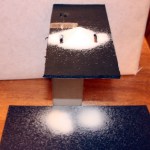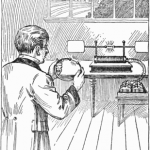
Via Curt Rice (or, more precisely, somebody on Twitter who posted a link to that, but I didn't note who) there's a new study in Frontiers in Psychology of the STEM "pipeline", looking at the history of gender disparities in STEM degrees. You can spin this one of two ways, the optimistic one being "Women now continue on from bachelors degrees to Ph.D.'s at the same rate as men!" and the pessimistic one being, well, Rice's post.
The accurate description, as is often the case in social science, "This stuff is really messy and confusing." Rather than being a set of nice straight pipes going from…
We're having a brutal cold snap at the moment, and while today's early-morning dog walk was considerably warmer than yesterday's, it was still 0F/-18C out, which is way colder than I like. When I came back in the house after the walk, my glasses instantly fogged up. But I had to take some stuff outside for the recycling, and within a few seconds of stepping back outside, they cleared right back up.
Now, I knew that would happen (which is why I hadn't bothered to wipe them off inside), but in one of those physicists-are-a-little-weird moments, for the first time, it occurred to me to wonder…
SteelyKid is spending a couple of days this week at "Nerf Camp" at the school where she does taekwondo. This basically consists of a bunch of hyped-up kids in a big room doing martial activities-- taekwondo class, board breaking, and "Nerf war" where they build an obstacle course and then shoot each other with dart guns. Which, of course, required the purchase of upgraded Nerf weaponry, as seen in the "featured image" above.
This thing fires darts at a fearsome speed-- they hit the ceiling with really loud "thwack" that was a huge hit with both kids. Of course, you know what's coming next,…
The final bit of meta-blogging I'll do this weekend is another look at what survives from past years. Unfortunately, when National Geographic took over, they broke our Google Analytics access, so I can't see blog stats from before mid-2012 any more. I do, however, have this old post listing the top posts of 2010, traffic-wise, which serves as a snapshot of what was popular at the time. It's interesting to see how this compares to the current list of top posts from 2010-- the approximate rank of 2010 posts based on traffic in 2014 is in parentheses:
A Lot of Knowledge Is a Dangerous Thing (…
Continuing the weekend theme of meta-blogging, one of the questions I've occasionally wondered about in doing top-posts lists for a given year is the problem of a bias against recency-- that is, that posts put up toward the end of the year are inherently at a disadvantage because they've had less time to integrate up the slow trickle of traffic that every page on the Internet gets. Obviously, this isn't a question that can be answered by data from 2014, but I have access to traffic stats back to mid-2012, so I can look at data for 2013. So, these are the top posts I put up in 2013 in terms of…
As a follow-up to yesterday's post about what draws the most traffic here, I went through and pulled out the top 20 posts from the blog (by traffic) for the calendar year 2014 that were first published in 2014. Numbers after the links are the fraction of the total pageviews for the year that each of these drew, according to Google Analytics:
"Earthing" Is a Bunch of Crap 1.03%
Tennis Ball Plus Soccer Ball Equals Blown Minds 0.65%
Impossible Thruster Probably Impossible 0.55%
Quick Interstellar Thoughts 0.54%
What Is Color? 0.52%
The Physics of Crazy Sleds 0.45%
Method and Its Discontents 0.43…
When I was writing up the state of blogging post last weekend, I thought about pulling together a Top Ten Posts thing, but didn't have time. also, Google analytics moved a bunch of stuff since the last time I used it, so I had a hard time locating the right options. Having tracked it down, though, I give you the ten highest-traffic blog posts from 2014, with the year of posting in parentheses, and the fraction of the total pageviews for the year that the post racked up, according to Google Analytics:
How Do I Kill the Squirrels who Are Eating My Car? (2010) 15.2%
Why Does Excel Suck so Much…
Rhett Allain has a list of 5 Things Every Human Should Know About Light, to tie in with the International Year of Light, and it's a good list with lots of .gifs. Of course, there are some gaps, so let me offer some additional things that everyone ought to know about light:
-- Light Is a Particle
Rhett and I have a long-running argument about the use of photons in introductory physics; he's against them for reasons that make no sense to me. To my mind, it is unquestionably true that light has particle-like properties (and here's a follow-up with some math), and that's a thing that everybody…
(When I launched the Advent Calendar of Science Stories series back in December, I had a few things in mind, but wasn’t sure I’d get through 24 days. In the end, I had more than enough material, and in fact didn’t end up using a few of my original ideas. So I’ll do a few additional posts, on an occasional basis, to use up a bit more of the leftover bits from Eureka: Discovering Your Inner Scientist…)
While Eureka is built around stories, it's really a book about the process of science, using those stories to highlight particular aspects of the scientific process. The hope is that making the…
No, not the little cover .jpg that I use as the "featured image" to tag these posts promoting Eureka. The post title refers to the Big Picture Science radio show from the SETI insitute. I'm one of the people interviewed in the latest episode, Maria Konnikova (author of Mastermind) and Louis Liebenberg.
This is another interview that was recorded remotely down at WAMC in Albany. They pushed back on my stock answers a little more than usual, which in one sense was fun, but was also pretty exhausting, as I was at the lowest point of the cold I'm just getting over now. I went home right after it…
I've done yet another piece for The Conversation, this one expanding on something I've been saying in interviews promoting Eureka: that knowing the process of science can help people sort good science from bad. In this particular case, I take the somewhat #slatepitch-y angle that the recent high-profile unraveling of the BICEP2 experiment's claim to detect primordial gravitational waves is a good thing:
Along with general disappointment, the new announcement has prompted discussion of what, if anything, the BICEP2 team did wrong. Many commentators fault them for over-hyping their results to…
I was going to let Andrew Sullivan's departure from blogging pass without comment-- I haven't been a regular reader of his stuff in around ten years, after all-- but a couple of mysterious guys in dark suits showed up at the house and pointed out that as someone who started blogging in 2002, I would face dire consequences if I didn't say anything at all. I offered to do two really short posts consisting of just links to Ezra Klein and Kevin Drum and the word "Indeed," but they weren't amused.
Truth be told, I do owe Sullivan a bit of a debt, and not just because he linked to me a few times…
This was a good week for "Chad bristles at side issues of massively reshared stories," with the Vox and gender bias stories, and also this PBS piece urging parents to tell their kids science stories. That probably seems surprising, given what I do around here, but while I fully endorse the end of that piece, the opening section in which Wendy Thomas Russell explains why she never liked science mostly makes me think that she's an awful person. She attributes her lack of interest in science to bad teaching, and provides a series of examples ending with:
Later, at the University of Nebraska, I…
I've seen a lot of reshares of this report about the long-term effect of gender bias in elementary math, which comes from an NBER working paper about a study of Israeli schools. The usual presentation highlights one specific result, namely that on a math test graded by teachers who knew the names of the students, boys outscored girls, but a blinded test saw girls outscore boys.
This sounds pretty damning, but also kind of puzzling-- is there really that much room for partial credit in elementary school math? Looking at the actual paper (which you can get emailed to you if you have a .edu…
I've seen a bunch of re-shares of this Vox profile of a "Men's Rights Activist" on various social media channels, with reactions varying from "This is fascinating" to "Boooo-ring." I thought it was sort of interesting, but not really in the way it was intended to be. The thing I found most striking the way the author, Emmett Rensin, introduces "Max":
In the popular imagination, Men's Rights Activists are "neckbeards": morbidly obese basement-dwellers with a suspect affection for My Little Pony. But Max is remarkably unassuming in appearance, handsome enough and normally tall; equally…
(When I launched the Advent Calendar of Science Stories series back in December, I had a few things in mind, but wasn’t sure I’d get through 24 days. In the end, I had more than enough material, and in fact didn’t end up using a few of my original ideas. So I’ll do a few additional posts, on an occasional basis, to use up a bit more of the leftover bits from Eureka: Discovering Your Inner Scientist…)
While we mostly think of science being done in comfortable institutes if not gleaming laboratories, one of the most impressive and inspiring things about science is that people can and do carry…
Probably the dumbest person I've ever met in my life was a housemate in grad school. I didn't do my lab work on campus, so I wasn't living in a neighborhood where cheap housing was rented to students, but in a place where folks were either genuinely poor, or in the market for very temporary lodgings while they looked for something better. There were low-income housing units across the street, and also an apartment building full of families who didn't quite qualify for welfare.
This particular guy rented one of the other rooms in the house, and worked a series of unskilled jobs-- assistant on…
It didn't make the news, because skittish media types are mostly based in New York City and thus don't care about anything north of Westchester County, but we had a big snow storm yesterday. It started snowing Sunday night, though, and kept up through pretty much dinnertime Monday. Both the local schools and the snow-day day-care program we signed the kids up for were shut down, with good reason- I had to go to campus for my 10:30 am class, and that two-mile drive was pretty nerve-wracking.
Since the kids were home for the day, we did a bit of playing outside, even though the temperatures…
Over at Scientific American's Frontiers for Young Minds blog, they have a great post on what happens when you ask scientists to explain key elements of a different research field. It's pretty funny, and rings very true, as SteelyKid asks me tons of science questions, very few of which have anything to do with atomic, molecular, or optical physics. so I spend a lot of time faking my way through really basic explanations of other fields.
Of course, even pitching stuff from my own field at the right level for small kids is a challenge. Which reminds me, I never did explain my presentation for…
(When I launched the Advent Calendar of Science Stories series back in December, I had a few things in mind, but wasn't sure I'd get through 24 days. In the end, I had more than enough material, and in fact didn't end up using a few of my original ideas. So I'll do a few additional posts, on an occasional basis, to use up a bit more of the leftover bits from Eureka: Discovering Your Inner Scientist...)
One of the things I was reacting against in writing Eureka is the popular idea of scientists as a sort of unworldly elite, off doing their ivory-tower idealized thing without worrying about…







